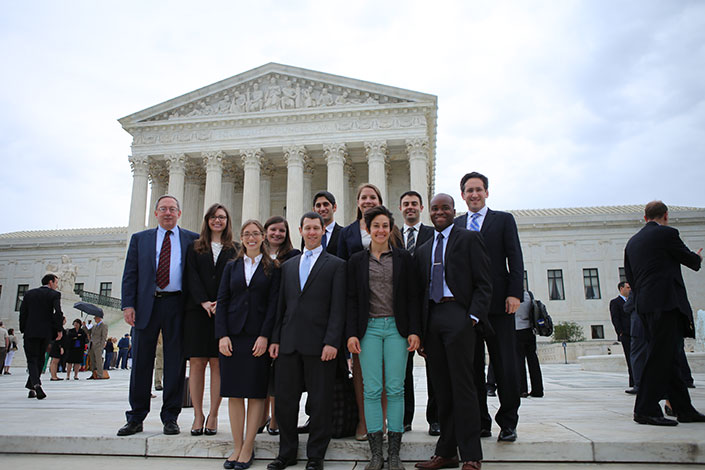The Supreme Court ruled unanimously Tuesday that an Arkansas inmate could wear a beard according to his religious beliefs, in a case argued by University of Virginia School of Law professor Douglas Laycock.
“This is a clear and unanimous statement from the Supreme Court,” Laycock said of the decision. “Prison officials, and courts, must take seriously the obligation to protect the religious practices of prisoners.”
Holt v. Hobbs, which Laycock argued on Oct. 7, involved an Arkansas correctional facility that refused to let Gregory Holt wear a half-inch beard, though hair longer than a half inch was allowed and beards a quarter inch or shorter were permitted for medical conditions. Holt brought the petition against corrections director Ray Hobbs and related parties under the Religious Land Use and Institutionalized Persons Act.
Holt, aka Abdul Maalik Muhammad, is serving a life sentence for burglary and domestic battery. He said the prison policy infringed upon his ability to practice his Muslim faith.
“This is not just a win for one Muslim prisoner in Arkansas — it is a win for prisoners of all faiths,” Laycock said.
In the Supreme Court’s opinion, authored by Justice Samuel Alito, the court said the Arkansas Department of Correction “fails to establish that its security concerns cannot be satisfied by simply searching a ½-inch beard.”
The court also didn’t agree with a key argument by the correctional facility: “The Department fails to show that enforcing its beard prohibition against petitioner furthers its compelling interests in preventing prisoners from hiding contraband and disguising their identities.”
Even before the Supreme Court took the case, Laycock said, 42 states, the District of Columbia and the federal Bureau of Prisons allowed a half-inch beard. Forty of those prison systems allow beards without a length limit.
“There are prison cases about long hair and full beards, about kosher diets, about keeping sacred texts and sacramental items in a cell, and about gathering for worship under appropriate supervision,” Laycock said. “This opinion will affect all those cases.”
Laycock is one of the nation’s leading authorities on the law of religious liberty. Holt v. Hobbs marked his fifth oral argument at the Supreme Court and his third case since he joined the Virginia Law faculty in 2010.
Last year, he argued Town of Greece v. Galloway, which sought to better define the legal limits of public prayer in government meetings. In 2012, Laycock argued and won by unanimous decision Hosanna-Tabor Evangelical Lutheran Church and School v. Equal Employment Opportunity Commission, which determined that employees who perform religious functions for religious institutions generally cannot sue for employment discrimination.
He has also argued Church of the Lukumi Babalu Aye v. City of Hialeah (1992), another unanimous win, and City of Boerne v. Flores (1996). He wrote the briefs for Santa Fe Independent School District v. Doe (1999).
Media Contact
Article Information
January 20, 2015
/content/supreme-court-rules-unanimously-professor-douglas-laycock-religious-liberty-case-involving

